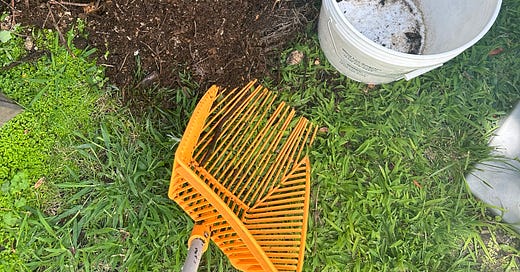Welcome to the second installment of Garden Essentials. Last week, we talked about the sun’s role in gardening, and today we’re getting our hands dirty with compost. If sunlight is the energy source for your plants, compost is their nutrient-dense meal, enriching the soil and keeping everything thriving.
We’ll walk through:
What compost is and why it’s essential, with a few personal anecdotes about how it transformed my own garden’s health.
How to make your own compost, covering different methods, what to include (and avoid), and tips for maintaining it. With links to my favorite products!
Common composting problems, like bad smells or pests, and how to troubleshoot them.
How to use compost effectively in your garden to improve soil health and plant growth.
This post is for paid subscribers, who will get full access to my archives, in-depth newsletters like this one, and other perks.
Why Compost is Essential for Your Garden
Think of compost as nature’s way of recycling nutrients and feeding your garden. It’s often called “black gold” for good reason—it transforms poor, lifeless soil into a rich, nutrient-dense environment where plants thrive, whether you’re growing vegetables, fruits, herbs, or even ornamental plants. When I first started gardening, I struggled with hard, compacted soil that didn’t have the nutrients my plants needed. Nothing seemed to grow well, no matter how much I watered or fertilized. Once I began adding compost, it was like night and day. My plants grew bigger, stronger, and produced more fruit. The leaves became lush and vibrantly green. Here’s how compost works its magic:
Compost Improves Soil Structure: Good soil structure is essential for healthy plant growth, and compost plays a key role in improving it. But what does "soil structure" mean? Essentially, it’s how the soil particles (sand, silt, and clay) group together to form clumps, leaving spaces (or pores) in between. These spaces allow for air, water, and roots to move freely through the soil. When soil is compacted or poorly structured, it becomes dense, making it hard for roots to grow deep and access the nutrients and water they need. Adding compost helps loosen up compacted soil by increasing the organic matter, creating a crumbly texture that plants love. This improved structure allows roots to spread out more easily, absorb nutrients better, and anchor the plants more securely in the ground.
Compost Slowly Releases Essential Nutrients: Unlike synthetic fertilizers that give plants a quick burst of nutrients, compost releases these nutrients slowly over time. This ensures your plants have a steady supply of what they need throughout the growing season. Compost acts like a slow-release fertilizer, gradually providing plants with three key nutrients they need to grow:
Nitrogen helps plants grow strong, healthy leaves and stems. It’s especially important for leafy vegetables like lettuce and spinach, but all plants need it to develop lush, green foliage.
Phosphorus is crucial for root development and flower/fruit production. Without enough phosphorus, plants may struggle to produce flowers or fruit, and their root systems won’t grow deep or strong.
Potassium improves overall plant health and helps them resist diseases. It also strengthens stems and contributes to a plant’s ability to handle environmental stress, like drought or frost.





